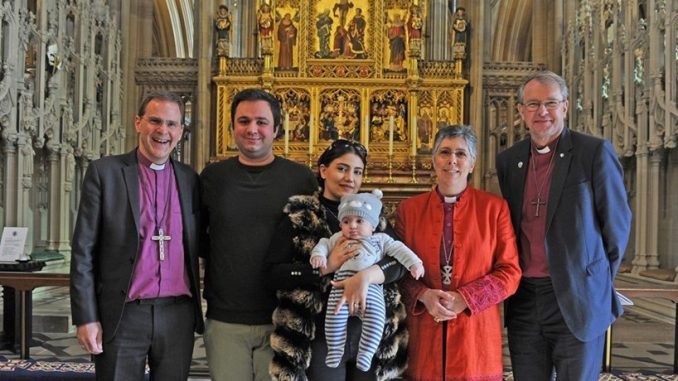
IRANIAN Christians from all over Britain turned Wakefield Cathedral into a party venue when they came to celebrate the first Common Worship eucharist translated into the Persian language Farsi.
It was standing room only as more than 500 people gathered last Saturday to picnic in the nave with their children and meet old friends. They then settled down for a two-hour bilingual service, which included the singing of hymn verses alternately in English and Farsi, and prayers in both languages. The printed order of service included phonetic spellings of the Farsi phrases, so that English speakers could join in with the Persian sections.
The Bishop of Bradford, Dr Toby Howarth, who assisted at the service, said that it had been created in response to requests from more than 75 churches around the country for Farsi-language resources to use alongside the English liturgy, so that the growing numbers of Iranians attending church could fully participate even while they were still learning English.
He said: “The publication of the Farsi-language service affirms the presence of Iranians in churches as a gift, and demonstrates commitment to welcoming them into the life of the Church of England.”
Presiding at the eucharist was the Iranian-born Bishop of Loughborough, Dr Guli Francis-Dehqani, who came to Britain as a 14-year-old when her father, the late Bishop Hassan Dehqani-Tafti, the first Persian Bishop in Iran, was forced into exile during the 1979 Islamic Revolution.
She said: “Something is happening within the Persian community in Britain. Iranians are by nature a spiritual people, and, if they come to our churches, we want them to feel welcomed. This is a really joyful thing for us to celebrate. It is very exciting.
“This is the start of something new. It is a very emotional day for me, hearing this service in Persian for the first time. This translated service is highly significant in the life of the Church of England, as we seek to find ways to adapt to the reality where we find minority communities as part of our congregations. I hope it will be the first of others to come.”
The Bishop of Durham, the Rt Revd Paul Butler, described in his sermon how he had been amazed to see the extensive and rapid growth of Farsi-speaking Christians in Britain, including several communities in his own and neighbouring dioceses. “It appears to be a significant work of God amongst Farsi speakers in this land,” he said.
In his sermon, which was translated into Farsi as he spoke, he reminded listeners that no English speaker would have been at the birth of the Church at the first Pentecost, 2000 years ago in Jerusalem. There would, however, have been those who spoke languages from which modern Farsi developed. “I had no ancestors there, but you might well have done,” he told the congregation.
“People from the lands of your ancestors were there. Your people were hearers and followers of the gospel of Jesus Christ long before our English predecessors became the same.”
He pointed out how St Luke had written a long list of the different nationalities present that day because he thought it was important “that all of his readers understand that, from the very first day of the Holy Spirit being poured out, the people of God are made up from many peoples, nations, and languages. Yes, at this point they are all Jews, but they are multilingual from the start.”
He described the translation as “a clear commitment to serve and a clear statement that all are equally part of the Church of England. Everyone matters: all count; all are to be helped to worship and learn.”
The first reading, Isaiah 4.1-7, was read in Farsi by Mohsen Chinaveh, an Iranian civil engineer who had fled from his home in Shiraz in 2017 with his wife, Sara, an architect, after their covert Christian community was discovered by the Islamic authorities. They had converted from Islam the year before, after a Christian friend had prayed for Sara, who was suffering a serious medical condition. A subsequent scan showed that it had cleared.
Their son was born in Wakefield, almost four months ago, and has been christened Masih, Farsi for “Jesus” or “Messiah”. He starred as the baby Jesus in the Wakefield Cathedral nativity play.
Mr Chinaveh welcomed the new liturgy, saying that it would help even those who could already speak English, because it gave “a good feeling to worship in your home language”. He said that, in Iran, his family would have faced arrest, imprisonment, and possibly even death. “But here I have the right to believe something the way I want. I am able to continue seeing the miracle of Jesus in my life.”
The liturgy can be downloaded here.
source: churchtimes
Leave a Reply